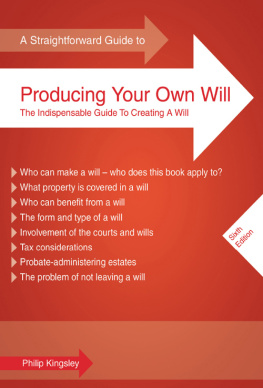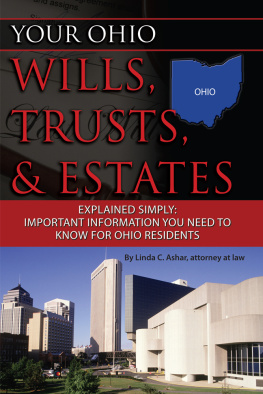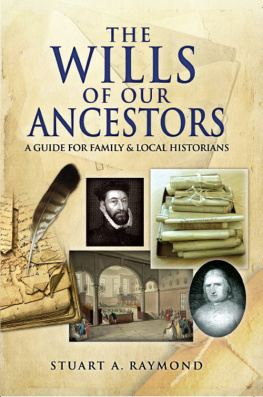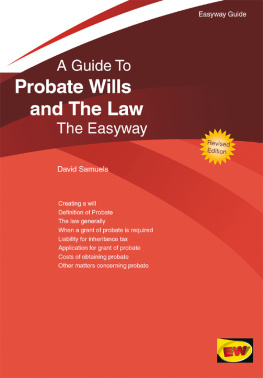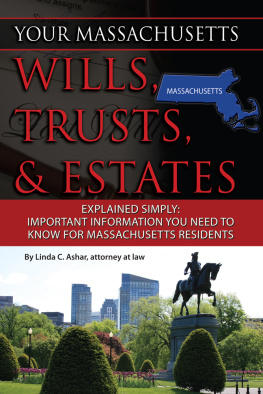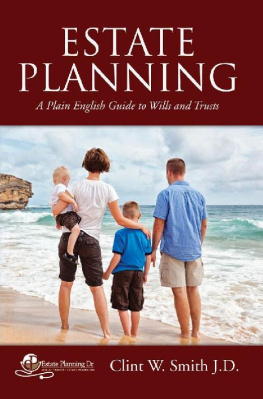A STRAIGHTFORWARD GUIDE TO PRODUCING YOUR OWN WILL
A STRAIGHTFORWARD GUIDE TO PRODUCING YOUR OWN WILL
Phillip Kingsley
www.straightforwardpublishing.co.uk
Straightforward Guides
Brighton BN7 2SH
Straightforward Publishing 2011
All rights reserved. No part of this publication may be reproduced in a retrieval system or transmitted by any means, electronic or mechanical, photocopying or otherwise, without the prior permission of the copyright holder.
British cataloguing in Publication Data. A catalogue record is available for this book from the British library.
ISBN 9781847162649
Printed by GN Digital Books
Cover design by Bookworks Islington
Whilst every effort has been taken to ensure that the information in this book is accurate at the time of going to press, the author and publisher recognise that the information can become out of date. This is particularly relevant to legal and tax information. The book is therefore sold on the understanding that no responsibility for errors and omissions is assumed and no responsibility is held for the information held within.
CONTENTS
************
Introduction
Over thirty million adults in the UK do not make a will. More worrying still, 75% of people with dependant children have not made a will, nor have 80% of couples living together without marrying. Yet those who die intestate can leave behind confusion and heartache because they have failed to make provisions for their loved ones. For example, if both parents die at the same time, in a car crash or similar accident, custody of their children may not go to the person they intended unless their wishes are made clear in a will.
Common misconceptions
A large percentage of people wrongly believe that if they die without making a will their husband or wife will inherit all their assets automatically. Similarly, almost 90% of parents who are married or in civil partnerships are unaware that if they die without a will the surviving partner will inherit a maximum of 250,000 from the state. Half the remainder of the estate would go directly to the children while the surviving partner would receive a life interest in the other half which would pass to the children on the surviving partners death.
This brief book is intended, mainly, for the person who wishes to understand the law and practice of drawing up an effective will and also the law as it affects probate and also the steps towards obtaining probate. It will also be very useful for those who are using a solicitor but wish to know more about the processes behind drawing up and executing a will.
There are more and more companies appearing on the scene now which will handle your will for you and also the process of probate but who will also charge hefty fees for the privilege. They will also charge you an annual fee for storing the will and can make costly mistakes which cause stress and loss for those dealing with the estate of the deceased. Unregulated will writers are operating without insurance or training, primarily because at the moment there is no regulation surrounding will writing and anyone is able to write a will. One of the major risks is that will-writing firms often ensure that they have themselves appointed as a sole of joint executor-the person responsible for administering the estate when the customer dies, then charge way over the odds to the bereaved relatives. Therefore you should avoid will writing firms, in fact avoid anyone other than a qualified solicitor. Banks have also been getting into the act often charging extortionate fees for the privilege. However, in 2011, Barclays, Lloyds, HSBC and the RBS group have all voluntarily agreed to review their will writing practices.
In many cases, people can write up their own wills and also apply for and handle the process of probate, choosing to get the help of a solicitor as and when needed. For anyone with a complicated estate, which is increasingly likely with todays changing family life, it is advisable to use a qualified solicitor to assist you with a will or handle probate.
Finally, there is another area of unregulated work, that of tracing heirs to an estate which has become another big industry which is leading to problems for those beneficiaries in that they have to pay big fees when located. This has been highlighted on the BBC2 series, Heir Hunters. We will discuss the process of probate at the end of the book. Again the advice is to employ a qualified solicitor and avoid any outside interference, ensuring that the solicitors are not using expensive companies to track down beneficiaries..
Chapter 1
Producing a Will-Key Points
The main principle underlying any will is that, if you have possessions, or any other assets, then you need to organise a will that will ensure that chosen people benefit after your death.
In the majority of cases, a persons affairs are relatively uncomplicated and should not involve the use of a solicitor.
There are certain basic rules to be followed in the formation of a will and if they are then it should be legally binding.
The only inhibiting factor on the disposal of your assets will be any tax liability following death, which will be dealt with later in this book. There are a number of other factors to consider, however:
Age of person making a will
A will made by anyone under the age of eighteen, known as a minor, will not be valid unless that person is a member of the services (armed forces) and is on active service.
Mental health considerations
A will formed by a person, who was insane at the time of writing, will not be valid. Mental illness in itself is not a barrier to creating a will, as long as proof can be shown that the person was not insane at the time of writing. Subsequent mental illness, following the formation of a will, will not be a barrier to a wills validity.
Definition of insanity
Insanity, or this particular condition, will normally apply to anyone certified as such and detained in a mental institution. In addition, the Mental Health Act covers those in a state of arrested or incomplete development of mind which includes sub-normality of intelligence and is of such a nature or degree that the patient is incapable of living an independent life or guarding against serious exploitation.
In any situation where there is doubt as to a persons capabilities then it is always best to have any will validated by an expert. This applies to anyone, not just those classified as insane.
The main point of any will is that, in the final analysis, a court would have to be satisfied that the contents of the will are genuine, there has not been any attempt whatsoever to alter the contents or to influence that persons mind. The person writing the will must have fashioned its contents with no outside interference.
Unfortunately, the history of the production of peoples last will and testament is littered with greedy and unscrupulous persons who wish to gain from anothers demise. It is necessary to be careful!
The Main Reasons for Making a Will
The main reason for making a will is to ensure that you make the choice as to who you leave your possessions to, and not the state. You can also impose any specific conditions you want in your will. For example, you can impose age conditions or conditions relating to the need to perform certain duties before benefiting.
If you do not make a will, or your will is invalid then, on your death, the law of intestacy will apply to the disposal of your estate. You will have had no say and certain criteria are applied by the state, which will take responsibility.
In the circumstances described above, after costs such as funeral and administration of other aspects of death, an order of preference is established.

